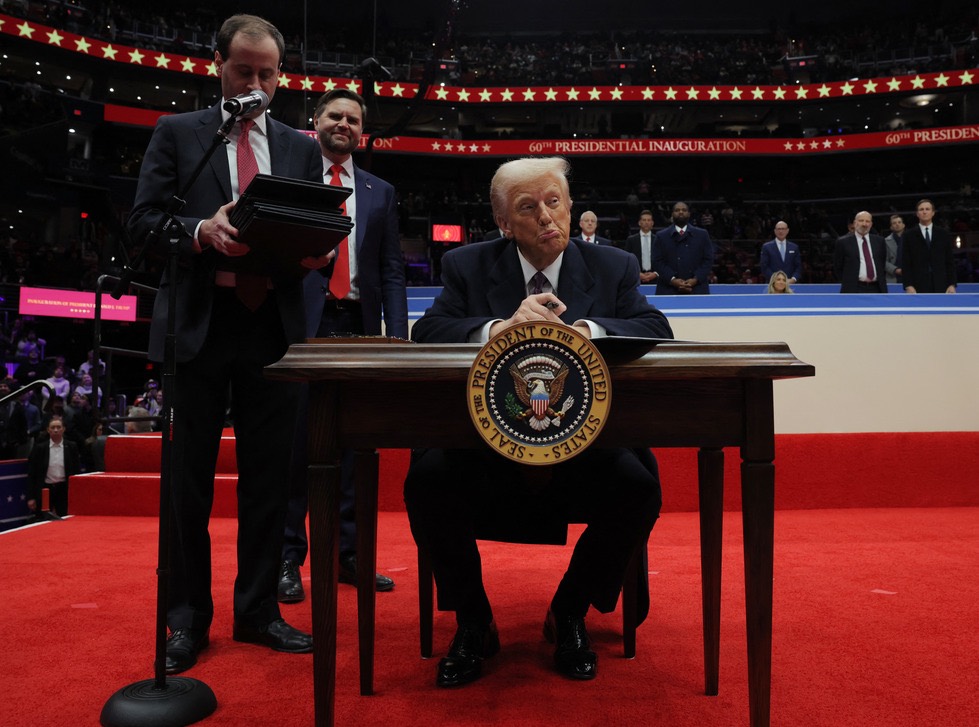Trump ends work from home for federal workers
President Donald Trump has ordered federal workers to return to the office five days a week and weakened job protections for civil servants, the first salvoes in his campaign to gut the federal bureaucracy.
The one-two punch would force large numbers of white-collar government employees to forfeit remote working arrangements, reversing a trend that took off in the early stages of the COVID-19 pandemic.
If upheld by the courts, the measures could also strip mid-level officials of the legal guarantees that generally keep them insulated from ideological purges.
Trump's allies have said the return-to-work mandate and the stripping of civil service protections—widely known as "Schedule F"—is intended to help the president replace long-serving government workers with loyalists faithful only to his agenda.
In a brief statement posted to the White House website, Trump ordered all heads of departments and agencies to "take all necessary steps to terminate remote work arrangements and require employees to return to work in-person at their respective duty stations on a full-time basis, provided that the department and agency heads shall make exemptions they deem necessary."
A second statement said that any power government officials have "is delegated by the President, and they must be accountable to the President."
It largely reinstates a late 2020 administrative order from Trump's first term that Joe Biden rescinded when he took power and is almost certain to draw swift pushback and litigation.
The National Treasury Employee Union, a labor union that represents federal government employees in dozens of agencies, sued Trump in a federal court in Washington earlier this week, aiming to block the "Schedule F" executive order.
The two orders are being paired with a hiring freeze and the creation of an advisory body—dubbed the Department of Government Efficiency (DOGE)—which is meant to help Trump take huge chunks out of the federal government and eliminate some agencies wholesale.
Experts say the aggregate effect of the changes will be to drive frustrated government employees out of their jobs, a goal the Trump team is explicitly gunning for.

Can Trump prohibit federal employees from working remotely?
It depends. The president has broad authority over the federal workforce, including the power to tell agencies to stop allowing remote work for employees who are not unionized. That includes supervisors and managers, who cannot join unions, and Trump could move quickly to order them back to the office.
But, about 26% of federal employees are unionized and many are covered by bargaining agreements that allow for remote work or hybrid arrangements. The Trump administration will have to wait for those to expire or try to renegotiate the agreements. Bargaining agreements between federal agencies and unions can only be challenged in court if they contain illegal terms or were the product of coercion, bribery or some other wrongdoing.
In some cases, federal agencies may also be required to allow employees with disabilities to work remotely. Federal law requires employers to grant "reasonable accommodations" to workers with chronic medical conditions as long as they can still perform their job duties.
How many federal employees work remotely?
The Trump White House said on Monday that only 6% of federal employees currently work in person, but government data shows that remote work is more limited. About 46% of federal workers, or 1.1 million people, are eligible for remote work, and about 228,000 of them are fully remote, according to a report issued by the White House Office of Management and Budget in August.
The U.S. Department of Defense and Department of Veterans Affairs, which have far more employees than other agencies, have the most remote workers, along with the Department of Health and Human Services. For federal employees who are eligible for remote work, about 61% of regular working hours are spent in person, according to OMB. That figure excludes fully remote workers.
Why does Trump oppose remote work?
Trump's order may also represent an effort to encourage some federal workers to quit, opening up positions that can be filled by political loyalists.
Elon Musk, who will lead a commission created by Trump to rein in government spending, said in a Nov. 20 Wall Street Journal opinion piece that federal workers should not be paid for "the COVID-era privilege" of telework. "Requiring federal employees to come to the office five days a week would result in a wave of voluntary terminations that we welcome," Musk wrote.
But, agencies may be leery of engaging in a large number of firings or layoffs, especially when they involve workers who hold important roles or are difficult to replace.
Trump's agenda, including potentially repealing thousands of federal regulations, coordinating a large number of deportations, and overhauling U.S. health policy, will require fully staffed agencies to execute. Experts said that in many instances, Trump will likely have to choose between culling the federal workforce and carrying out other initiatives.
Can the president fire workers who resist return to office mandates?
The president and agency heads have broad authority to fire non-union workers for cause, which could include defying a mandate to return to the office. But federal employees must be given written notice that they are being fired at least 30 days in advance, including an explanation of the reason for their termination and an opportunity to respond.
And federal workers who lose their jobs can bring a challenge before the Merit Systems Protection Board, an independent three-member panel appointed by the president, seeking to be reinstated. Employees could argue to the board that they were not fired for cause, that agencies did not follow the proper procedures and violated their due process rights, or that they were targeted for discriminatory reasons. The board's decisions are binding unless they are set aside by a federal appeals court. (by Raphael Satter and Daniel Wiessner, Reuters)


